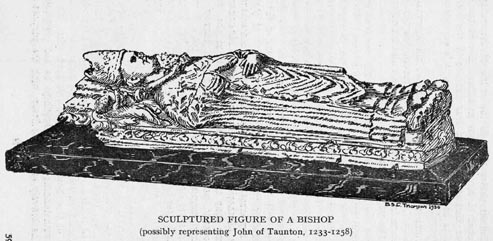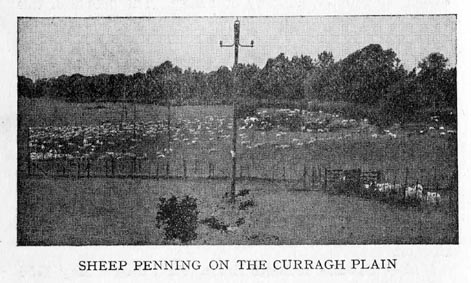A PILGRIM PRIEST OF KILDARE
FATHER BENJAMIN JOSEPH
BROUGHALL
THIS remarkable priest was born in Kildare town about the year 1780. He entered Carlow College on the 7th November, 1795, and left on the 7th August1796. He continued his studies at Salamanca, in Spain, and at the Irish College, Rome, and was there ordained to priesthood, probably early in the year 1807.
Shortly after his ordination, he set out on his journey home. On his arrival in Ireland in 1807, Father Broughall was appointed C.C. at Raheen, Queens County, where he laboured for some ten years. Amongst the fruits of his zeal was the erection of the present Chapel of Ease at Shanahoe. In June 1818 he was promoted P.P. of Graig-na-managh. Soon after his coming to Graig-na-managh, Father Broughall built a modest residence.
He had scarcely completed his house, when he was afflicted with a long and dangerous illness. When all natural remedies seemed unavailing, with lively faith he made a vow that if restored to health, he would go on a pilgrimage to Jerusalem, and after returning, take the habit of the Carthusians. The great Dr. Doyle, "J.K.L." offered Father Broughall leave of absence for two or three years for the benefit of his health. He began his pilgrimage in the year 1822, travelling entirely on foot except what he was necessarily obliged to pass by sea.
Father Broughall met many difficulties after setting out as a pilgrim. When he arrived at Paris he was so ill from the fatigues of the long walk that he was confined to bed for five weeks, and was not expected to recover. After some time however he regained sufficient strength and took up once more his pilgrim’s staff and set out on "the Path to Rome," and thence with the blessing of the Supreme Pontiff, for the Holy land. Father Broughall acknowledges the great kindness he received from the Holy Father, Pius VII, who blessed the pilgrim’s habit and clothed him therewith, explained the difficulties and dangers that lay before him, and offered even to dispense him from his vow, "but resigning myself," says Father Broughall, "into the holy hands of Almighty God, through the intercession of the ever Immaculate Blessed Virgin Mary, I determined to comply with my vow." And so with wonderful patience, perseverance and trust in God, he overcame all difficulties and accomplished his pious and penitential pilgrimage. In a letter to the bishop of Kildare and Leighlin he states: "I left Rome, possessing no riches except my breviary and pilgrim’s staff. I was obliged to traverse every port in Italy before I could procure a passage to the East. There is such a decay of religion on the Continent that the generality of the captains to whom I applied refused to take me, many of them insulted me; however after long perseverance and many difficulties, Almighty God in His goodness provided me with a ship at Leghorn for the island of Cyprus, where I embarked a second time for Bayrout, a seaport in Syria. From thence I proceeded on foot, to Nazareth, the river Jordan, Mount Thabor, Tiberias, Bethlehem and Jerusalem, and to all the sacred places sanctified by the miracles and holy life of Our Redeemer. I arrived in Jerusalem very much fatigued, but on entering Mount Calvary forgot all my difficulties. The many Stations representing the sufferings and Passion of Our Blessed Redeemer, the view of that awful place on which He purchased our redemption, the sight of the Holy Sepulchre, filled me with gratitude for His unparalleled mercy to us, and His extraordinary favour to me in bringing me to the place of my redemption. I celebrated Holy Mass at the different stages of the Passion of our Divine Redeemer. I visited Mount Olivet whence Our Blessed Redeemer ascended into heaven. I also celebrated Mass in the Garden of Gethsemane. The Valley of Josaphat is situated between the Garden of Gethsemane and Mount Calvary. The torrent Cedron passes through the south of the valley. In Bethlehem I remained four months. The Stable in which Our Blessed Redeemer was born is in the same condition as at the sacred birth. There is a sumptuous church erected over the Stable."
In November, 1827, having accomplished his pilgrimage to the Holy Land, he set out on his return journey to Rome and to Ireland. Difficulties, dangers and infirmities confront the way-worn pilgrim.
In Rome the Holy Father, Pope Leo XII received the Irish Pilgrim Priest with every mark of kindness. While in Rome on his way home to Ireland, Father Broughall was again visited with fever and dysentery which continued two months. "In Cairo I lodged in the Convent. There were six religious, four clergymen, and two lay brothers who were the only missioners in that country, all of whom though in perfect health on my arrival, were in a few days after seized with that fatal distemper. I attended them, administered to them the last Sacraments, each of them dying in my arms. I accordingly undertook to discharge the duty of these venerable, holy, deceased Missioners. During my stay in Grand Cairo there died in the city forty thousand persons. On resuming my journey to Ireland my complaints again returned in Genoa; I was obliged to enter hospital for eight months. I left Genoa something better but had to enter hospital again in Barcelona, where I was confined to bed twelve months with continual fever. I was not expected to recover; I received the Last Sacraments. My recovery astonished the physicians. On my arrival in Madrid I had to enter hospital again, where I was confined to bed for four months." Father Broughall was back again in Ireland in 1838, and during his stay he resided at Carlow College, where the President, Dr. Fitzgerald, invited him to make his permanent abode. The man of God however declined this kind offer. So in 1839 notwithstanding all the harsdhips [hardships – sic] he had previously endured, he bravely set out for Italy, with the purpose of spending the remainder of his life as an humble hermit in that favoured land. After many difficulties and trials Father Broughall arrived at Naples.
Father Broughall spent the last ten years of his life in the calm seclusion of the cloister; for in 1840 he was admitted into the celebrated Benedictine Monastery of Monte Cassino where he edified everyone by his great piety, and where his memory is revered as that of a saint. His special devotions were towards Our Lord ever present in the Most Holy Sacrament, and towards the Blessed Virgin, whom he delighted to style "Ever Immaculate." In 1848 the King of Naples and his family visited Monte Cassino. On going to the church to make their devotions the royal visitors found Father Broughall in adoration before the Tabernacle. They came and knelt behind him, and on leaving, each of the royal party reverentially took up and kissed the hem of the habit of the holy religious, who was so absorbed in his devotion as to be wholly unconscious of their presence.
Father Broughall died on the feast of the Ascension 1850 in the seventy first year of his age. Such was the fame of his piety that the monks and many secular persons thronged round his bed for the eight days that his illness continued. He is buried in Monte Cassino.
The memory of this remarkable priest seems to have faded almost entirely from Kildare. Towards the end of the eighteenth century a Broughall family lived beside the road in a field still called Broughall’s field, now Mr. Fitzgerald’s, where it adjoins Mrs. Berry’s land. The field between that and the Foundry is called Butler’s field. The Broughall house is shown on the Ordnance Map of 1837. At this time English troops distributed through the country lived by the system of "free quarters" staying in the people’s houses, and taking food without payment. Night after night the skies were ablaze with burning houses and chapels. The Broughall homestead was burned down one Sunday evening. A large crowd of neighbours gathered to sympathise with them, for it had been their home for generations. The Broughall family went to live in Kildare in Bride Street. There were many thatched houses from Messrs. Bolands down towards the present church. The people of Cherryville, Pack Bush and adjoining districts built a house for them in the lane leading from Pack Bush to Rathwalkin. Father Broughall who was born in Kildare town in 1780 may have been of this family.
Thomas or Lawrence may have been the name of the man whose house was burned. He had a brother Timothy unmarried who lived in a house at Cherryville Cross on Mr. Johnson’s land. He was shot by English soldiers and his house burned as he was seen crossing a field with a pike in his hand one evening after a meeting at Gallows Cross. This three road cross is about half a mile from Cherryville in Kildangan district. It is said a priest was hanged there. This information was given in 1925 by Ellen Boughall [Broughall? - sic] whose father, Thomas Boughall [Broughall? – sic], was a grand-nephew of the Broughall brothers already mentioned. Ellen was about 90 years of age when she died in 1929. Her mother’s name was Carthy: the ruins of the Carthy home are still to be seen on the back road from Pack Bush. This back road was once known as the "sixty-six," because there were sixty-six houses from Pack Bush to Cross Morris. Ellen Broughall lived up the lane from Pack Bush, probably in the house that has been built for the Broughall family who were burned out about 1779. Miss Ellen Broughall had three sisters, Sarah, Maria and Brigid and one brother Timothy, a railway engine driver who distinguished himself by his bravery on the occasion of a railway smash near Roscrea about 1905. Mr. Laurence Broughall of Meitta Road is a nephew of Miss Ellen Broughall.
The descendants of the Broughall family at Cherryville built a house again on the old holding. It was occupied in 1880 by John Broughall, whom Mr. John Melia remembers to live there. A Broughall family, probably relatives of the Cherryville Broughall family, lived at Mount Rice opposite Christopher Moore’s about 1890. The ruins of the house are still to be seen. There were seven sons. The father was Michael and the mother formerly Miss Maher. They were stricken by a fever from which the parents did not recover. The boys wished to go to America, so their uncle Peter Maher paid their passage to the U.S.A., took over their homestead and burned the house in ease any trace of the fever might have remained. The youngest boy, Laurence, was ordained in the U.S.A.

